Unit3 Getting together Topic1 SectionD课件(共17张PPT)
文档属性
| 名称 | Unit3 Getting together Topic1 SectionD课件(共17张PPT) |  | |
| 格式 | zip | ||
| 文件大小 | 3.8MB | ||
| 资源类型 | 教案 | ||
| 版本资源 | 仁爱科普版 | ||
| 科目 | 英语 | ||
| 更新时间 | 2022-09-01 15:43:22 | ||
图片预览

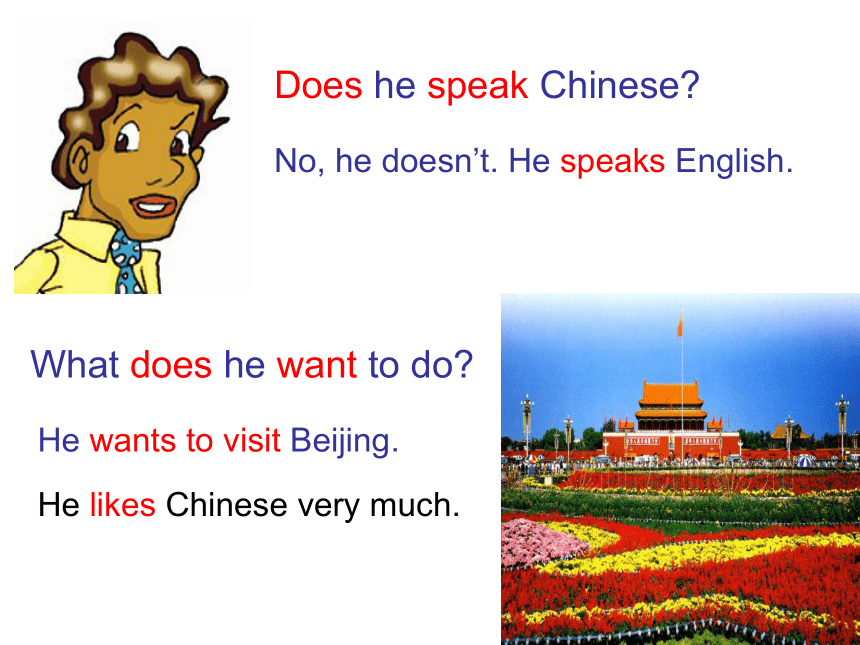
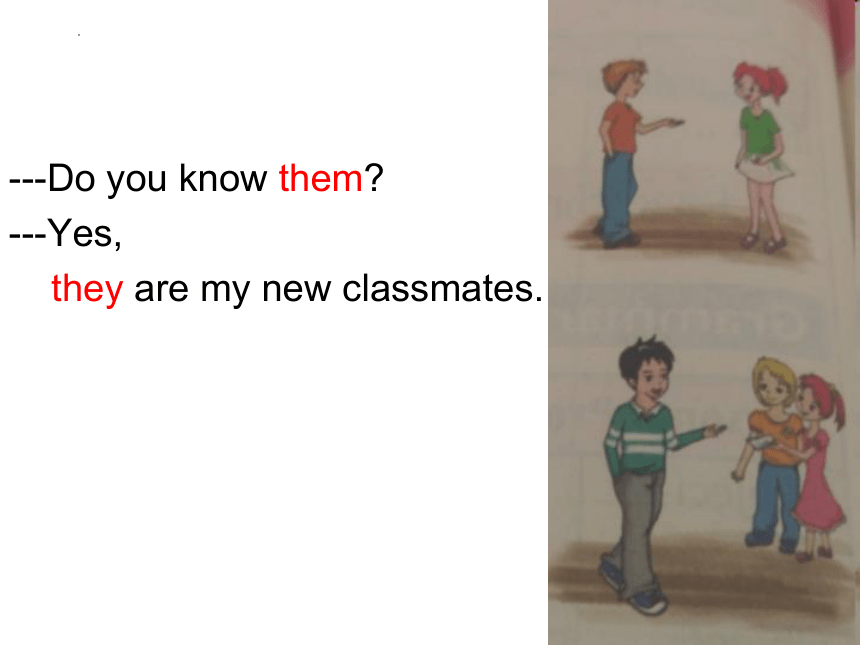
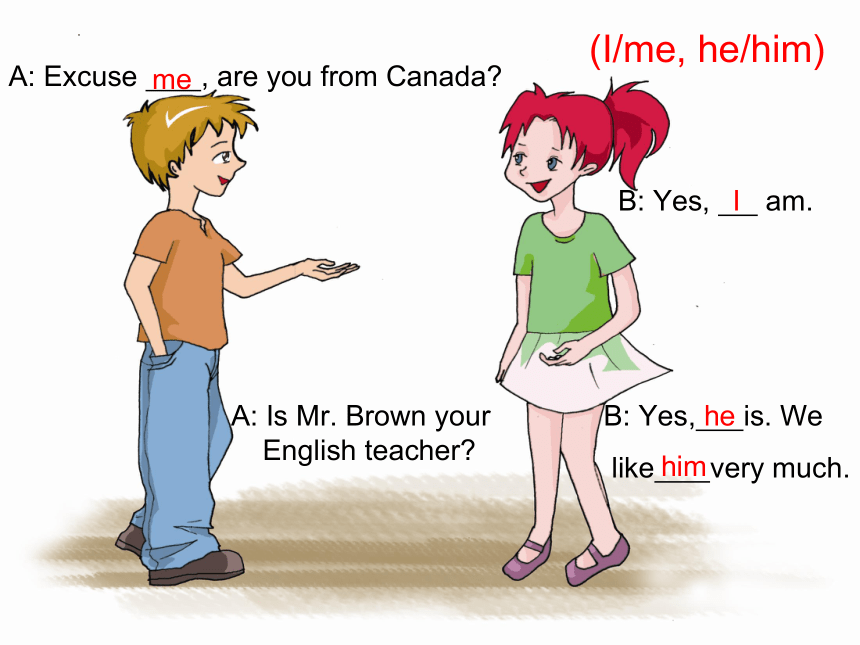
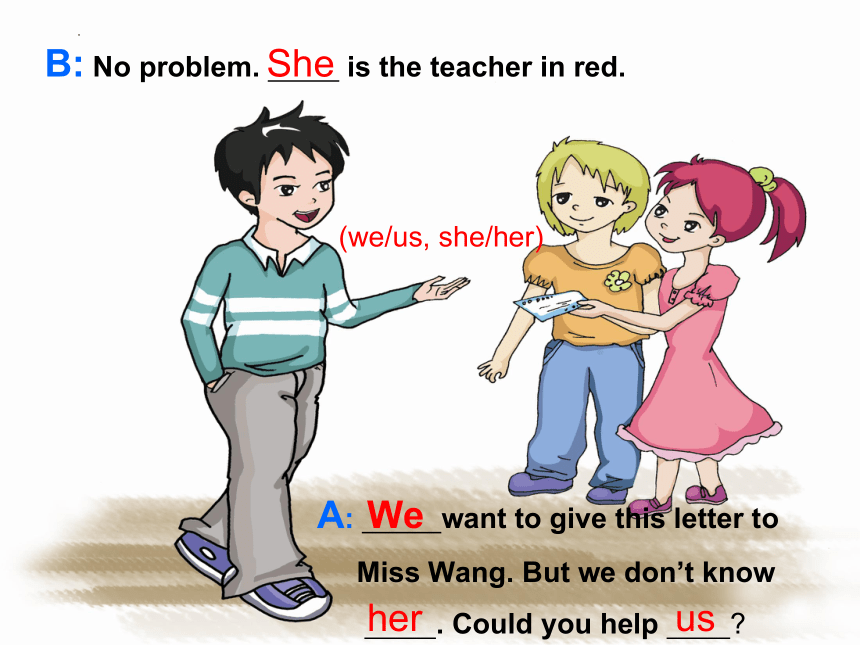
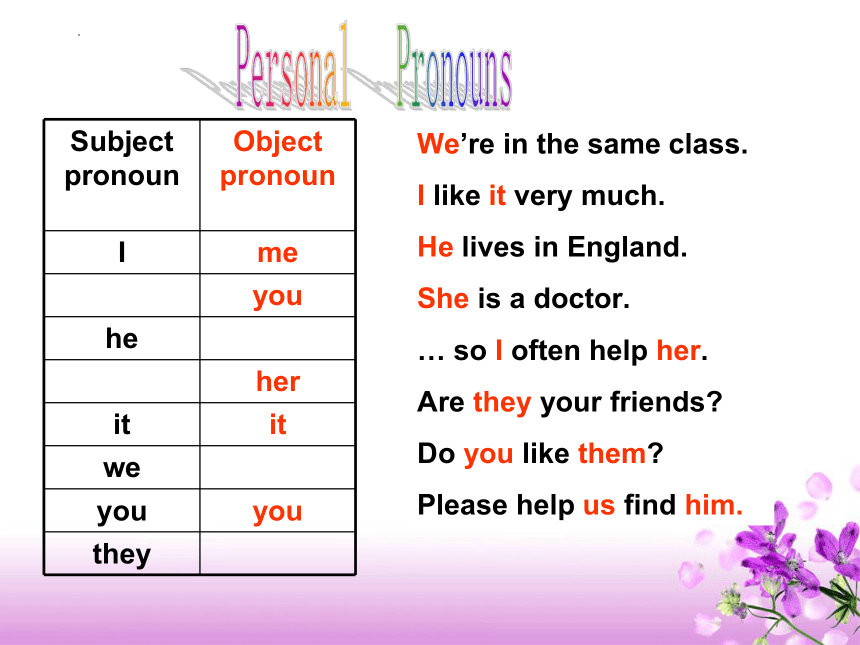
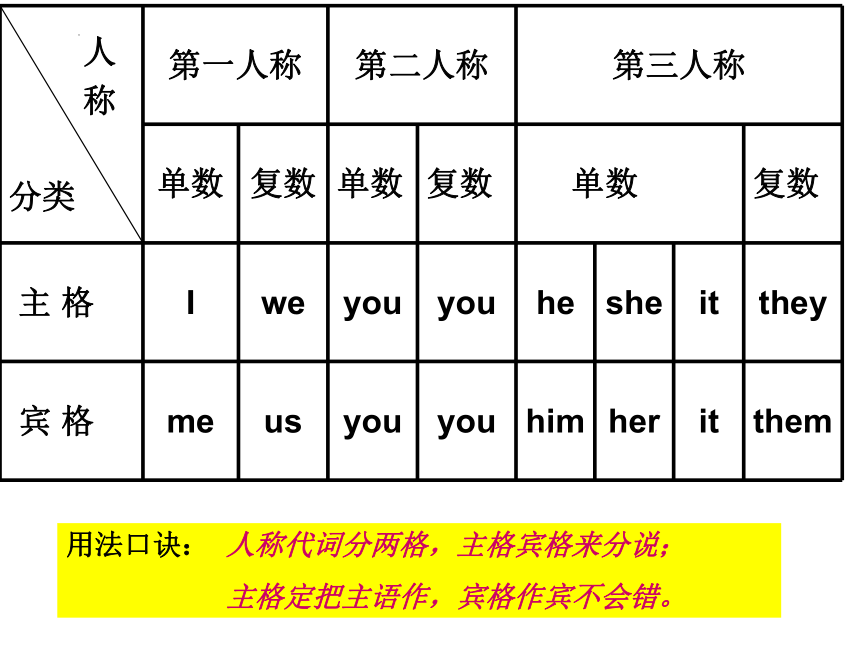
文档简介
(共17张PPT)
Unit 3 Topic 1
Does he speak Chinese
Section D
Does he speak Chinese
No, he doesn’t. He speaks English.
What does he want to do
He wants to visit Beijing.
He likes Chinese very much.
---Do you know them
---Yes,
they are my new classmates.
A: Excuse , are you from Canada
A: Is Mr. Brown your
English teacher
B: Yes, am.
B: Yes, is. We
like very much.
(I/me, he/him)
me
I
he
him
(we/us, she/her)
A: want to give this letter to
Miss Wang. But we don’t know
. Could you help
B: No problem. is the teacher in red.
her
us
She
We
Subject pronoun Object pronoun
I me
you
he
her
it it
we
you you
they
We’re in the same class.
I like it very much.
He lives in England.
She is a doctor.
… so I often help her.
Are they your friends
Do you like them
Please help us find him.
Personal Pronouns
人 称 分类 第一人称 第二人称 第三人称
单数 复数 单数 复数 单数 复数
主 格 I we you you he she it they
宾 格 me us you you him her it them
用法口诀: 人称代词分两格,主格宾格来分说;
主格定把主语作,宾格作宾不会错。
A: Excuse me, (could/do) you
please tell me your name
B: Sure. My name is Jane.
A: Could you help me with it
B: (No/Not) problem.
could
No
Functions
Functions
A: Do you (like/likes) Chinese
B: Yes, I like it very much/a lot/a little./
No, I don’t like it at all.
like
Exercise:
1. He (want/wants) to Beijing.
2. She (like/likes) it a lot.
3. (Does/Do) he speak Chinese
Yes, he (does/do). / No, he doesn’t.
4. (Does/Do) Lucy speak Chinese
Yes, she does. / No, she (don’t/doesn’t).
5. (Does/Do) they speak Chinese
Yes, they (does/do). / No, they don’t.
wants
likes
Does
does
Does
doesn’t
Do
do
Present Simple
时态就是时间加状态。
“一般现在时”的时间就是现在,状态就是一般状态。
一、基本介绍:
1,概念:经常、反复发生的动作或行为,或某种状态。
2.常用的时间状语:often,sometimes,every day等,可以看出来都一些表示经常性的时间状语。
3.基本结构:主语 + 动词。如果主语为第三人称单数,动词要用第三人称单数形式,其他的用动词原形。
时态:一般现在时
4.否定形式: be动词:主语 + am/is/are + not。
行为动词:主语 + don’t/doesn’t + 动词原形。
5.一般疑问句:be动词:把be动词放于句首,
行为动词:把助动词do/does放于句首。
Do/Does + 主语 + 动词原形 。
6.简单例句:
He plays basketball everyday.他每天都打篮球。
He doesn’t play basketball everyday.他不是每天都打篮球。
Does he play basketball everyday 他是不是都每天打篮球?
时态:一般现在时
三、判断方法
方法1:自己判断是否用一般现在时,如果时间是现在的时间,再加上状态不是过去的,正在进行的或者完成的, 那么就用一般现在时(这个最接近本质)。
方法2:判断别人写的句子,看动词的形式,如果是原形或第三人称单数,就是一般现在时。
时态:一般现在时
Read the following sentences and match them with pictures on the next page.
I like English very much. I have many English books. I often read them. These books help me a lot with my English.
B. I am an actor. I often visit America, Canada and England. I meet a lot of people. Some of them have blond hair and blue eyes.
C. Every day I read many letters from my pen pals. These letters are in English.
D. I have many friends. They come from America. Some of them can speak Chinese well. They often help me with my English.
do/does开头的一般疑问句。
(1)你经常去购物吗?
(2)你在这有好朋友吗?
(3)你的朋友喜欢英语吗?
(4)她讲英语吗?
(5)他帮助你学汉语吗?
Have a try!
Homework
Good-bye!
Unit 3 Topic 1
Does he speak Chinese
Section D
Does he speak Chinese
No, he doesn’t. He speaks English.
What does he want to do
He wants to visit Beijing.
He likes Chinese very much.
---Do you know them
---Yes,
they are my new classmates.
A: Excuse , are you from Canada
A: Is Mr. Brown your
English teacher
B: Yes, am.
B: Yes, is. We
like very much.
(I/me, he/him)
me
I
he
him
(we/us, she/her)
A: want to give this letter to
Miss Wang. But we don’t know
. Could you help
B: No problem. is the teacher in red.
her
us
She
We
Subject pronoun Object pronoun
I me
you
he
her
it it
we
you you
they
We’re in the same class.
I like it very much.
He lives in England.
She is a doctor.
… so I often help her.
Are they your friends
Do you like them
Please help us find him.
Personal Pronouns
人 称 分类 第一人称 第二人称 第三人称
单数 复数 单数 复数 单数 复数
主 格 I we you you he she it they
宾 格 me us you you him her it them
用法口诀: 人称代词分两格,主格宾格来分说;
主格定把主语作,宾格作宾不会错。
A: Excuse me, (could/do) you
please tell me your name
B: Sure. My name is Jane.
A: Could you help me with it
B: (No/Not) problem.
could
No
Functions
Functions
A: Do you (like/likes) Chinese
B: Yes, I like it very much/a lot/a little./
No, I don’t like it at all.
like
Exercise:
1. He (want/wants) to Beijing.
2. She (like/likes) it a lot.
3. (Does/Do) he speak Chinese
Yes, he (does/do). / No, he doesn’t.
4. (Does/Do) Lucy speak Chinese
Yes, she does. / No, she (don’t/doesn’t).
5. (Does/Do) they speak Chinese
Yes, they (does/do). / No, they don’t.
wants
likes
Does
does
Does
doesn’t
Do
do
Present Simple
时态就是时间加状态。
“一般现在时”的时间就是现在,状态就是一般状态。
一、基本介绍:
1,概念:经常、反复发生的动作或行为,或某种状态。
2.常用的时间状语:often,sometimes,every day等,可以看出来都一些表示经常性的时间状语。
3.基本结构:主语 + 动词。如果主语为第三人称单数,动词要用第三人称单数形式,其他的用动词原形。
时态:一般现在时
4.否定形式: be动词:主语 + am/is/are + not。
行为动词:主语 + don’t/doesn’t + 动词原形。
5.一般疑问句:be动词:把be动词放于句首,
行为动词:把助动词do/does放于句首。
Do/Does + 主语 + 动词原形 。
6.简单例句:
He plays basketball everyday.他每天都打篮球。
He doesn’t play basketball everyday.他不是每天都打篮球。
Does he play basketball everyday 他是不是都每天打篮球?
时态:一般现在时
三、判断方法
方法1:自己判断是否用一般现在时,如果时间是现在的时间,再加上状态不是过去的,正在进行的或者完成的, 那么就用一般现在时(这个最接近本质)。
方法2:判断别人写的句子,看动词的形式,如果是原形或第三人称单数,就是一般现在时。
时态:一般现在时
Read the following sentences and match them with pictures on the next page.
I like English very much. I have many English books. I often read them. These books help me a lot with my English.
B. I am an actor. I often visit America, Canada and England. I meet a lot of people. Some of them have blond hair and blue eyes.
C. Every day I read many letters from my pen pals. These letters are in English.
D. I have many friends. They come from America. Some of them can speak Chinese well. They often help me with my English.
do/does开头的一般疑问句。
(1)你经常去购物吗?
(2)你在这有好朋友吗?
(3)你的朋友喜欢英语吗?
(4)她讲英语吗?
(5)他帮助你学汉语吗?
Have a try!
Homework
Good-bye!
同课章节目录
- Unit 1 Making new friends
- Topic 1 Welcome to China!
- Topic 2 Where are you from?
- Topic 3 How old are you?
- Unit 2 Looking different
- Topic 1 I have a small nose
- Topic 2 What does she look like?
- Topic 3 Whose jacket is this?
- Unit 3 Getting togethe
- Topic 1 Does he speak Chinese?
- Topic 2 What do your parents do?
- Topic 3 What would you like to drink?
- Unit 4 Having fun
- Topic 1 What can I do for you?
- Topic 2 Would you like to cook with us?
- Topic 3 What time is it now?
